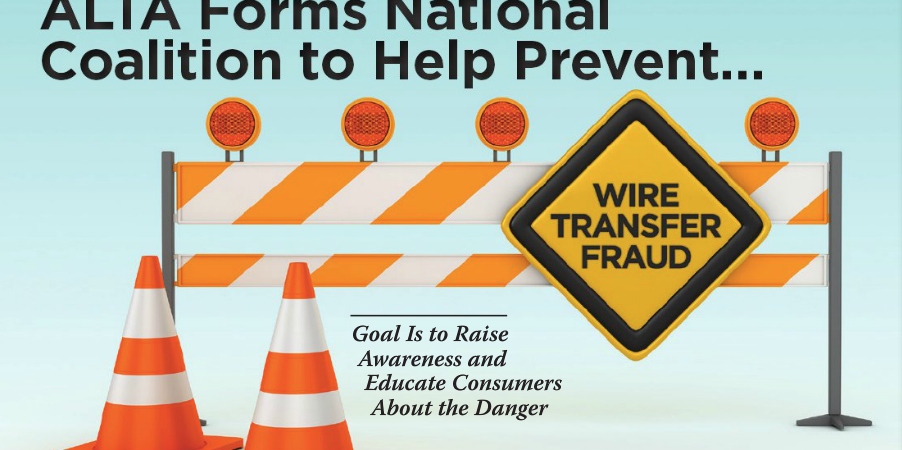VOLUME 98 | ISSUE 7 | JULY 2019
IN 2018, there were at least 11,300 victims of real estate wire fraud who lost a total of $150 million. According to the FBI, this number is even higher because only a small percentage of all wire fraud incidents is reported.
While the title industry continues to layer safeguards into the into the escrow and closing process, security gaps among other parties involved in the transaction continue to leave money vulnerable. According to a report, one in five consumers clicks links in phishing emails, while half of consumers click on links in personalized spear phishing emails. These social engineering schemes often lead to wire fraud. Despite efforts over the past few years by various groups— including ALTA—half of surveyed consumers are not concerned about wire fraud even though 75 percent of the same people were warned by their real estate agent, title company or bank during the transaction. In addition, 76 percent have never seen coverage of the issue on the news and are likely only hearing about it at the closing.
To help raise awareness and educate homebuyers, and real estate and mortgage professionals about the risk and urgency of the problem, ALTA in June launched the national Coalition to Stop Real Estate Wire Fraud (stopwirefraud.org).
“ALTA has worked for years to push awareness among members, shared best practices and recommended changes in policy to protect consumers against wire fraud,” said Cynthia Durham Blair NTP, ALTA’s president. “Without seeing, hearing and reading about the local impact and real-life stories of fraud victims, regulators and Congress are unlikely to act. A coalition will help transform this from an issue only known to industry to one that is widely covered in local and national press.”
The coalition—which will include corporate partners, trade associations and consumer advocates—will deploy an integrated and coordinated communications strategy to break through to the targeted audience. A multi-channel approach will include earned and paid media efforts to raise awareness with consumers and key audiences in the real estate community. To launch, ALTA has identified three markets as the most favorable to millennial, first-time homebuyers: Birmingham, Ala.; Pittsburgh; and Virginia Beach, Va.
“We will provide concrete steps that people can take to prevent the risk of wire fraud when buying a home,” Blair said. “We want to identify and empower those who have been victimized to tell their story and advocate for solutions.”
CLOSING COSTS FOR A SINGLE-FAMILY PROPERTY IN 2018
averaged $5,779 including taxes—and $3,344 excluding taxes—according to the latest data from ClosingCorp.
ClosingCorp cost calculations include lender’s title, owner’s title, appraisals, settlement fees, recording fees, land surveys and transfer taxes. To determine the average single-family home sale ranges, ClosingCorp uses home price data from CoreLogic to create a $100,000 price range.
“The average home price is a number, but not necessarily a real property with a real closing,” said Dori Daganhardt, senior vice president of data strategy at ClosingCorp. “To get a sense of what is really going on in the market, we compared real cost data on more than 1.5 million purchase transactions that went through our SmartFees platform in 2018. We also used ‘market-specific’ rates and fees charged by the most active settlement services providers in each geographic area, not just network averages.”
The 2018 report shows the jurisdictions with the highest average closing costs, including taxes, were:
1. District of Columbia ($24,613)
2. New York ($13,581)
3. Delaware ($13,309)
4. Washington ($12,667)
5. Maryland ($11,395)
The states with the lowest closing costs, including taxes, were:
1. Missouri ($1,887)
2. Indiana ($2,002)
3. South Dakota ($2,149) 4. Iowa ($2,248)
5. Nebraska ($2,267)
The jurisdictions with the highest average closing costs, excluding taxes, were:
1. District of Columbia ($5,694) 2. New York ($5,586)
3. Hawaii ($5,318)
4. California ($5,284)
5. Washington ($4,701)
The states with the lowest closing costs, excluding taxes, were:
1. Missouri ($1,887) 2. Nebraska ($1,919)
3. South Dakota ($1,995) 4. Indiana ($2,002)
5. Iowa ($2,011)
“Because closing costs are based on sale price and taxing jurisdictions, the rankings of high and low-cost states tend to be relatively static,” said Bob Jennings, chief executive officer of ClosingCorp. “However, that doesn’t mean that various jurisdictions aren’t continually contemplating increases and adjustments. Our research showed more than one-third of all counties considered an adjustment to their taxes in 2018, and adjustments in more than 200 counties actually went into effect. These include some interesting twists.
For example, four New York counties let their local mortgage tax expire and then reinstated the same tax; and the city of Baltimore introduced a ‘yield tax,’ which is essentially a ‘tax on tax.’ We expect to see even more adjustments in 2019, including a new law which increases the mansion tax on a sliding scale for transfers where the consideration is in excess of $2 million in New York City—already one of the cities with the highest closing costs.”
Full article found at https://www.alta.org/title-news/2019/v98i07/#?page=0

